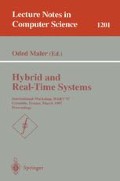Abstract
Hybrid systems contain both discrete and continuous components, and therefore it is desirable to have a method which decomposes the verification of a hybrid system into verification of its continuous and discrete components. In this paper, the system we consider may have non-trivial discrete components, such as computer algorithms with iteration structures. We take the view that a single discrete action is instantaneous, and a finite number of discrete actions happening at one time point is still instantaneous, but infinitely many discrete actions occurring at one time leads to losing control of the continuous components and this should in general be avoided in a design. We develop a variant of Duration Calculus in which we embed Hoare Logic used to verify discrete components. Several other rules are proposed in the calculus for proving temporal properties. The paper concludes with a simple example.
Preview
Unable to display preview. Download preview PDF.
References
Zhou Chaochen and M. R. Hansen. Chopping a point. In J-F. He, editor, Proc. BGS FACS 7th Refinement Workshop:Theory and Practice of System Design, Bath, U.K., July 1996. Springer-Verlag.
Zhou Chaochen, C.A.R. Hoare, and A.P. Ravn. A calculus of durations. Information Processing Letters, 40(5):269–276, 1991.
Zhou Chaochen, Dang Van Hung, and Li Xiaoshan. A duration calculus with infinite intervals. In Fundamentals of Computation Theory, Horst Reichel (Ed.), pages 16–41. LNCS 965, Springer-Verlag, 1995.
Zhou Chaochen, A.P. Ravn, and M.R. Hansen. An extended duration calculus for hybrid systems. In Hybrid Systems, R.L. Grossman, A. Nerode, A.P. Ravn, H. Rischel (Eds.), pages 36–59. LNCS 736, Springer-Verlag, 1993.
C. A. R. Hoare. Communicating Sequential Processes. Prentice-Hall, 1985.
R. Koymans. Specifying Message Passing and Time-Critical Systems with Temporal Logic. LNCS 651, Springer-Verlag, 1992.
Z. Manna and A. Pnueli. Verifying hybrid systems. In Hybrid Systems, R.L. Grossman, A. Nerode, A.P. Ravn, H. Rischel (Eds.), pages 36–59. LNCS 736, Springer-Verlag, 1993.
B. Moszkowski. A temporal logic for multilevel reasoning about hardware. IEEE Computer, 18(2):10–19, 1985.
P.K. Pandya. A recursive duration calculus. Technical report, CS-95/3, Computer Science Group, TIFR, Bombay, 1995.
A. Pnueli. Development of hybrid systems. In H. Langmack, W.-P. de Roever, and J. Vytopil, editors, Formal Techniques in Real-Time and Fault-Tolerant Systems, pages 77–85. LNCS 863, Springer-Verlag, 1994.
Xu Qiwen and Yang Zengyu. Derivation of control programs: a heating system. In Presented at the 4th International Conference on Hybrid Systems, Ithaca, NY, USA, 1996.
Author information
Authors and Affiliations
Editor information
Rights and permissions
Copyright information
© 1997 Springer-Verlag Berlin Heidelberg
About this paper
Cite this paper
Qiwen, X. (1997). Semantics and verification of extended phase transition systems in Duration Calculus. In: Maler, O. (eds) Hybrid and Real-Time Systems. HART 1997. Lecture Notes in Computer Science, vol 1201. Springer, Berlin, Heidelberg. https://doi.org/10.1007/BFb0014734
Download citation
DOI: https://doi.org/10.1007/BFb0014734
Published:
Publisher Name: Springer, Berlin, Heidelberg
Print ISBN: 978-3-540-62600-8
Online ISBN: 978-3-540-68330-8
eBook Packages: Springer Book Archive

